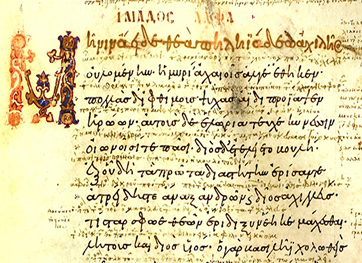Back at the end of the calendar year I was interviewed by Jerry Johnston HBU’s “Think About It” podcast. They try to highlight different faculty from the University. We had a lot of fun doing this. Please have a listen if you’re interested!
Back at the end of the calendar year I was interviewed by Jerry Johnston HBU’s “Think About It” podcast. They try to highlight different faculty from the University. We had a lot of fun doing this. Please have a listen if you’re interested!
I recently came across a few photos of signs and instructions that were spelled incorrectly or had suffered from inappropriate chopping by the word-processor. That reminded me of some cakes I’ve seen where the text of the customer’s Vorlage (the text in front of them, or in their head) did not make it onto the baker’s 















 cake unscat
cake unscat hed. Some of these sorts of scribal errors would be classified under errors of hearing, although in many instances it’s simply a matter of faulty comprehension: they heard the word correctly, but failed to understand the intention. Enjoy.
hed. Some of these sorts of scribal errors would be classified under errors of hearing, although in many instances it’s simply a matter of faulty comprehension: they heard the word correctly, but failed to understand the intention. Enjoy.
This was an interesting post about why studying the original languages is important. My Hebrew students who are reading some Psalms with me this semester know this to be true! There is so much playing with language in poetry; no English translation can possibly deliver to its readers what the Hebrew readers devour with delight! [By the way, the site from which this comes is interesting, but they also post on things from the classical world that are bawdy. So reader beware, if you decide to poke around some more.]
From Boswell’s Life of Samuel Johnson:
We talked of translation. I said, I could not define it, nor could I think of a similitude to illustrate it; but that it appeared to me the translation of poetry could be only imitation. JOHNSON. ‘You may translate books of science exactly. You may also translate history, in so far as it is not embellished with oratory, which is poetical. Poetry, indeed, cannot be translated; and, therefore, it is the poets that preserve languages; for we would not be at the trouble to learn a language, if we could have all that is written in it just as well in a translation. But as the beauties of poetry cannot be preserved in any language except that in which it was originally written, we learn the language.’
 This is best in the original!
This is best in the original!
I cannot take credit for the following; my MA student (at HBU)  Benjamin Summers forwarded these to me months ago. But they *are* enjoyable.
Benjamin Summers forwarded these to me months ago. But they *are* enjoyable.
—————————
Q: Why don’t Bible translators ever buy matte paint?
A: Because they’re always looking for a good gloss.
—————————
Q: Which Hebrew letter is nothing to sneeze at?
A: Allergic nun.
—————————
Q: Which Old Testament authors found the most gems and nuggets of wisdom?
A: The miner prophets.
—————————
Q: What kind of machine would Siskel & Ebert use to determine whether a film gets a thumbs-up or a thumbs-down?
A: Their critical apparatus.
—————————
Q: What story did the Hebrew professor tell around the campfire?
A: The tale of the headless relative clause.
—————————
Q: What flavor gum does a rabbi chew?
A: Tar gum.
—————————
Q: How is an exegete different from a submarine captain?
A: One searches through a periscope while the other searches through a pericope.
—————————
Q: If you don’t practice using a lexicon, why will your translation stink?
A: Because not brushing up gives you HALOT-osis.
—————————
Q: The sentence topic that was just here – where did it go?
A: It left dislocation.
—————————
Q: Why couldn’t the overly humble student tell a direct object from an adjunct prepositional phrase?
A: He just didn’t know how to take a complement.
—————————
Q: What moral lesson can we learn from identifying verbless clauses?
A: What’s right isn’t always copular, and what’s copular isn’t always right.
Nice illustration from Derek Rishmawy about how good modern insights on the text have often already found their way into the life of the Church. Calvin is still insightful, after 500 years.
 One of my favorite things about reading the Reformers, or the Fathers for that matter, is finding that the best insights I’ve loved in modern scholars aren’t really that new at all. Take the concept of ‘new creation.’ For many of us, N.T. Wright is probably the modern scholar who brought our attention to the theology of new creation. At least for me he did. In his many works on Paul, the Resurrection, and Christian Origins, again and again, he calls us to hear the proclamation that in Christ’s life, death, and resurrection all things, the cosmos as a whole, have been renewed. God wasn’t simply concerned with saving souls off to an ethereal heaven, but rather faithfully rescuing the world from the decay into which it had fallen. Resurrection isn’t just for people, but the universe as a whole. This is bracing and beautifully good news.
One of my favorite things about reading the Reformers, or the Fathers for that matter, is finding that the best insights I’ve loved in modern scholars aren’t really that new at all. Take the concept of ‘new creation.’ For many of us, N.T. Wright is probably the modern scholar who brought our attention to the theology of new creation. At least for me he did. In his many works on Paul, the Resurrection, and Christian Origins, again and again, he calls us to hear the proclamation that in Christ’s life, death, and resurrection all things, the cosmos as a whole, have been renewed. God wasn’t simply concerned with saving souls off to an ethereal heaven, but rather faithfully rescuing the world from the decay into which it had fallen. Resurrection isn’t just for people, but the universe as a whole. This is bracing and beautifully good news.
As great as learning…
View original post 466 more words
Just posted this link to my recent message on Psalm 121 to our HBU School of Christian Thought blog. Hope it gives encouragement to someone out there!
Earlier this month I delivered a message at Bethel Bible Fellowship on Psalm 121. In it, I explored the universality of the human condition as one of neediness:
“Let’s not fool ourselves: we are indeed needy people, when we find ourselves there at that point of deep need, we will seek help from somewhere. The question that confronts us today is, ‘Where do you seek your ultimate source of help in this broken, sinful world?’ When the chips are down, where do you lean the hardest? Fundamentally–there are only two answers to the question, ‘Where do you seek help, ultimately?’: Either in [a] Human Resources (myself, family, merely human wisdom, technology and civilization, education, self-help books, etc.), OR in [b] Divine Resources (God: God’s wisdom, God’s power, God’s perspective, God’s instructions, God’s promises, God’s plans).”
In the message, I expound the Psalmist’s motivations for us to look to God as…
View original post 22 more words
In linguistics we have a term for how you can use patterns to create new words: productivity. For example, the -ly suffix can be added to many adjectives to create new adverbs: “nice” becomes “nicely” while “able” becomes “ably.” That’s a productive pattern. What’s amazing is that children who are learning to speak a language natively start using such productive patterns intuitively, without ever being told explicitly how to do it. And they are correct most of the time. But when they misapply a productive pattern, it’s often funny. Tonight, I heard another funny. This evening Andrew and Kathryn (our 7 year old twins) decided they would sleep under a make-shift tent created by draping bed sheets over chairs and stools. As I was helping them lay down their make-shift beds, Andrew determined that he would use a huge beach towel as his “blanket.” Kathryn objected, misapplying a productive word-formation pattern:
“But . . . that’s not . . . blanketable.”
I’m still smiling. 🙂
My gracious and lovely wife has picked up her proverbial pen to begin blogging. In the last two days she is already more prolific than I am on actual blog posts for 2012! Her blog, Women Walking Wisely, provides her ruminations and biblically-informed thoughts on a variety of things that average, everyday Christian wives, mothers, daughters, and women may find interesting and helpful. I know that I have benefited over the years from her wise words and godly counsel–I hope that you will, too. You can find her blog at Women Walking Wisely. Happy New Year, and congratulations, Cheryl Marshall!
If you are interested in seeing more, you can click here to see Daystar University’s webpage featuring Afrizo. Here is a little blurb:
“Daystar University in Nairobi, Kenya is sending its African gospel style musical group, Afrizo to sing in concerts across the U.S. in fall 2009. Afrizo sings music from South, Central, and East Africa, drawing on rich African traditions. The group hopes to raise $350,000 for scholarships to send promising young people to college who wouldn’t otherwise be able to attend. ”
Daniel and Tonya at Hebrew and Greek Reader just posted a 20-questions interview with Brian Webster of Dallas Theological Seminary. It sounds very much like he has just gotten published the Hebrew Grammar that *I* was planning to write some day! 🙂 Having also been influenced by Isaac Jerusalmi directly (I studied Syriac with him at Hebrew Union College during my Ph.D. studies in Louisville at Southern Seminary) and indirectly (through interaction with Russell Fuller and working through his textbook), I found a lot in the interview about his pedagogical approach that jibed with my own. I’m looking forward to checking it out and seeing if it’s what I was really hoping to write!
All I can say is, “Where do I get my autographed copy?” Congratulations to Brian Webster, and thanks to D&T for posting a fascinating interview!